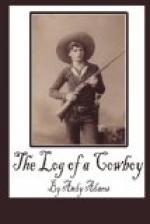The following morning our guide led us for several hours up a gradual ascent to the plateau, till we reached the tableland, when he left us to return to his own camp. Flood again took the lead, and within a mile we turned on our regular course, which by early noon had descended into the valley of the Judith River, and entered the Fort Maginnis and Benton military road. Our route was now clearly defined, and about noon on the last day of the month we sighted, beyond the Missouri River, the flag floating over Fort Benton. We made a crossing that afternoon below the Fort, and Flood went into the post, expecting either to meet Lovell or to receive our final instructions regarding the delivery.
After crossing the Missouri, we grazed the herd over to the Teton River, a stream which paralleled the former watercourse,—the military post being located between the two. We had encamped for the night when Flood returned with word of a letter he had received from our employer and an interview he had had with the commanding officer of Fort Benton, who, it seemed, was to have a hand in the delivery of the herd. Lovell had been detained in the final settlement of my brother Bob’s herd at the Crow Agency by some differences regarding weights. Under our present instructions, we were to proceed slowly to the Blackfoot Agency, and immediately on the arrival of Lovell at Benton, he and the commandant would follow by ambulance and overtake us. The distance from Fort Benton to the agency was variously reported to be from one hundred and twenty to one hundred and thirty miles, six or seven days’ travel for the herd at the farthest, and then good-by, Circle Dots!
A number of officers and troopers from the post overtook us the next morning and spent several hours with us as the herd trailed out up the Teton. They were riding fine horses, which made our through saddle stock look insignificant in comparison, though had they covered twenty-four hundred miles and lived on grass as had our mounts, some of the lustre of their glossy coats would have been absent. They looked well, but it would have been impossible to use them or any domestic bred horses in trail work like ours, unless a supply of grain could be carried with us. The range country produced a horse suitable to range needs, hardy and a good forager, which, when not overworked under the saddle, met every requirement of his calling, as well as being self-sustaining. Our horses, in fact, were in better flesh when we crossed the Missouri than they were the day we received the herd on the Rio Grande. The spectators from the fort quitted us near the middle of the forenoon, and we snailed on westward at our leisurely gait.




